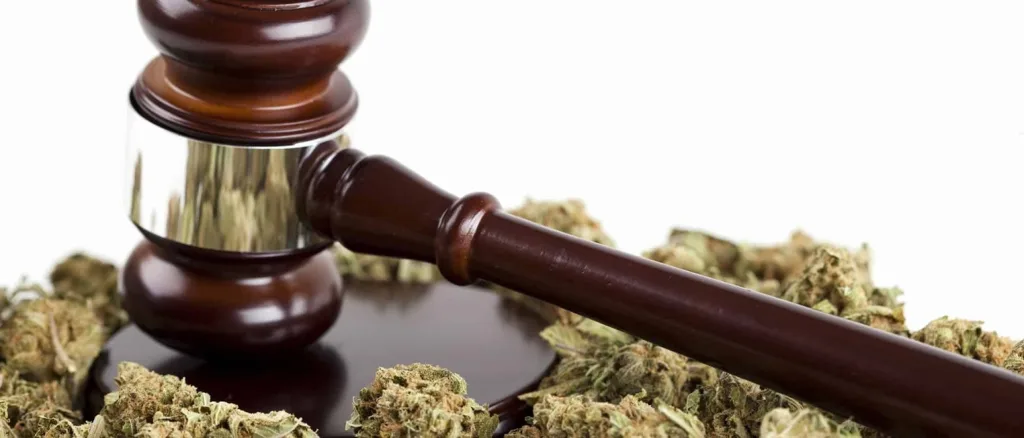Today, Congressmembers Troy A. Carter, Sr. (D-LA) and Kelly Armstrong (R-ND) introduced bipartisan legislation to create an expungement mechanism for low-level violations of federal marijuana law and provide an expedited, orderly process that clears the deck of non-felony marijuana offenses lingering in the federal system.

The Marijuana Misdemeanor Expungement Act “would deliver justice for countless Americans whose lives have been disrupted and deprived because of a misdemeanor Marijuana offense”, states a press release sent today.
Thirty-eight states, three territories, and the District of Columbia currently allow the use of cannabis products, including for medical or recreational use.
“No one should be in jail just for using or possessing marijuana”, said Rep. Carter. “This bipartisan bill will restore justice to millions of Americans who have suffered excessive secondary consequences associated with marijuana-related misdemeanors. These misdemeanors, even without a conviction, can restrict the ability to access educational aid, housing assistance, occupational licensing, and even foster parenting. Delivering justice for people who have been impacted by marijuana-related misdemeanors is a vital part of comprehensive cannabis reform.”
The October 6, 2022, presidential pardon (Proclamation 10467) is estimated to impact at least 6,500 people with federal convictions related to simple possession of marijuana, attempted simple possession of marijuana, or use of marijuana, and will restore the civil rights lost when an individual commits certain crimes, including the right to vote, sit on a jury, and hold elected office. However, clemency acts do not expunge criminal records or remove them from public view.
In May, President Biden took steps to reclassify marijuana from a Schedule I to a Schedule III drug under federal law. This came after the Department of Health and Human Services (HHS) and the Department of Justice (DOJ) studied the drug’s medical use, abuse, and dependency potential and recommended rescheduling, concluding reclassification would remove barriers to critical research.
“Records matter and carrying a low-level non-criminal petty offense on a record could heavily impact a person’s way of life from sustaining employment to applying to new opportunities,” said Rep. Armstrong. “The Marijuana Misdemeanor Expungement Act gives a second chance to non-violent petty marijuana offenders after the sentence is complete and removes barriers to reentry while upholding the rule of law and supporting a more equitable society.”
“With cannabis programs established in 38 states, it is beyond unjust that individuals with minor marijuana charges continue to be punished for these previous offenses for what is now legal activity in a majority of the country,” said Saphira Galoob, Executive Director of the National Cannabis Roundtable. “Cannabis-related criminal justice reform efforts must remain at the forefront of federal reform efforts to begin to address the harms caused by decades of the misguided War on Drugs. The National Cannabis Roundtable applauds the leadership of Reps. Carter and Armstrong in doing just that with the introduction of the Marijuana Misdemeanor Expungement Act in the 118th Congress to break down barriers caused by prior cannabis-related convictions when individuals are seeking educational, housing, and employment opportunities.”
“While thousands of individuals with federal simple marijuana possession charges were pardoned by President Biden in 2022, the unfortunate reality is that those records still follow them even after that historic act of clemency. But Congress has the authority to provide the expungements necessary to wipe the slate clean and provide a true second chance,” said Weldon Angelos, President of the Weldon Project. “Our federal marijuana and criminal justice policies must be reformed to recognize the fact that cannabis is now legal in 38 states as we continue to move towards ending prohibition. I want to thank Congressman Carter and Congressman Armstrong for introducing this bill creating a mechanism to expunge low-level violations of federal marijuana law, which will be nothing short of lifechanging for countless families impacted by the War on Drugs.”
“The bill is synthetic by design, drawing upon current federal law, previous congressional bills, and various secondary works,” said Professor Erik Luna of Arizona State University and founder of the Academy for Justice at ASU’s Sandra Day O’Connor College of Law. “The goal is to create a method for expunging marijuana-related misdemeanors and other low-level offenses that is comprehensive, coherent, efficient, and just, all without threatening public safety. Along the way, the scheme seeks to capture whatever lessons can be drawn for future efforts, such as relief for federal marijuana-related felonies and federal offenses for other controlled substances, for instance, and the possibility of automatic record-clearing and general expungement provisions. The bill thereby offers a national symbol of reform that also sets the stage for further informed congressional relief.”
The bill’s full text can be found by clicking here.






